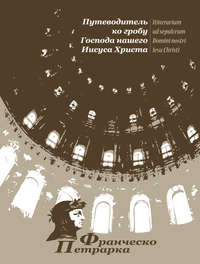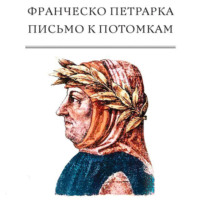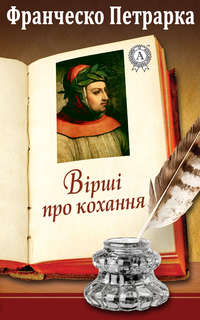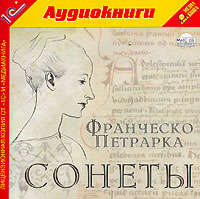The Sonnets, Triumphs, and Other Poems of Petrarch
 полная версия
полная версияThe Sonnets, Triumphs, and Other Poems of Petrarch
Жанр: зарубежная поэзиязарубежная классиказарубежная старинная литературастихи и поэзиясерьезное чтениеcтихи, поэзия
Язык: Английский
Год издания: 2018
Добавлена:
Настройки чтения
Размер шрифта
Высота строк
Поля
SONNET LX
Ite, rime dolenti, al duro sassoHE PRAYS THAT SHE WILL BE NEAR HIM AT HIS DEATH, WHICH HE FEELS APPROACHINGGo, plaintive verse, to the cold marble go,Which hides in earth my treasure from these eyes;There call on her who answers from yon skies,Although the mortal part dwells dark and low.Of life how I am wearied make her know,Of stemming these dread waves that round me rise:But, copying all her virtues I so prize,Her track I follow, yet my steps are slow.I sing of her, living, or dead, alone;(Dead, did I say? She is immortal made!)That by the world she should be loved, and known.Oh! in my passage hence may she be near,To greet my coming that's not long delay'd;And may I hold in heaven the rank herself holds there!Nott.Go, melancholy rhymes! your tribute bringTo that cold stone, which holds the dear remainsOf all that earth held precious;—uttering,If heaven should deign to hear them, earthly strains.Tell her, that sport of tempests, fit no moreTo stem the troublous ocean,—here at lastHer votary treads the solitary shore;His only pleasure to recall the past.Tell her, that she who living ruled his fate,In death still holds her empire: all his care,So grant the Muse her aid,—to celebrateHer every word, and thought, and action fair.Be this my meed, that in the hour of deathHer kindred spirit may hail, and bless my parting breath!Woodhouselee.
SONNET LXI
S' onesto amor può meritar mercedeHE PRAYS THAT, IN REWARD FOR HIS LONG AND VIRTUOUS ATTACHMENT, SHE WILL VISIT HIM IN DEATHIf Mercy e'er rewardeth virtuous love,If Pity still can do, as she has done,I shall have rest, for clearer than the sunMy lady and the world my faith approve.Who fear'd me once, now knows, yet scarce believesI am the same who wont her love to seek,Who seek it still; where she but heard me speak,Or saw my face, she now my soul perceives.Wherefore I hope that e'en in heaven she mournsMy heavy anguish, and on me the whileHer sweet face eloquent of pity turns,And that when shuffled off this mortal coil,Her way to me with that fair band she'll wend,True follower of Christ and virtue's friend.Macgregor.If virtuous love doth merit recompense—If pity still maintain its wonted sway—I that reward shall win, for bright as dayTo earth and Laura breathes my faith's incense.She fear'd me once—now heavenly confidenceReveals my heart's first hope's unchanging stay;A word, a look, could this alone convey,My heart she reads now, stripp'd of earth's defence.And thus I hope, she for my heavy sighsTo heaven complains, to me she pity showsBy sympathetic visits in my dream:And when this mortal temple breathless lies,Oh! may she greet my soul, enclosed by thoseWhom heaven and virtue love—our friends supreme.Wollaston.
SONNET LXII
Vidi fra mille donne una già taleBEAUTY SHOWED ITSELF IN, AND DISAPPEARED WITH, LAURA'Mid many fair one such by me was seenThat amorous fears my heart did instant seize,Beholding her—nor false the images—Equal to angels in her heavenly mien.Nothing in her was mortal or terrene,As one whom nothing short of heaven can please;My soul well train'd for her to burn and freezeSought in her wake to mount the blue serene.But ah! too high for earthly wings to riseHer pitch, and soon she wholly pass'd from sight:The very thought still makes me cold and numb;O beautiful and high and lustrous eyes,Where Death, who fills the world with grief and fright,Found entrance in so fair a form to come.Macgregor.SONNET LXIII
Tornami a mente, anzi v' è dentro quellaSHE IS SO FIXED IN HIS HEART THAT AT TIMES HE BELIEVES HER STILL ALIVE, AND IS FORCED TO RECALL THE DATE OF HER DEATHOh! to my soul for ever she returns;Or rather Lethe could not blot her thence,Such as she was when first she struck my sense,In that bright blushing age when beauty burns:So still I see her, bashful as she turnsRetired into herself, as from offence:I cry—"'Tis she! she still has life and sense:Oh, speak to me, my love!"—Sometimes she spurnsMy call; sometimes she seems to answer straight:Then, starting from my waking dream, I say,—"Alas! poor wretch, thou art of mind bereft!Forget'st thou the first hour of the sixth dayOf April, the three hundred, forty eight,And thousandth year,—when she her earthly mansion left?"Morehead.My mind recalls her; nay, her home is there,Nor can Lethean draught drive thence her form,I see that star's pure ray her spirit warm,Whose grace and spring-time beauty she doth wear.As thus my vision paints her charms so rare,That none to such perfection may conform,I cry, "'Tis she! death doth to life transform!"And then to hear that voice, I wake my prayer.She now replies, and now doth mute appear,Like one whose tottering mind regains its power;I speak my heart: "Thou must this cheat resign;The thirteen hundred, eight and fortieth year,The sixth of April's suns, his first bright hour,Thou know'st that soul celestial fled its shrine!"Wollaston.
SONNET LXIV
Questo nostro caduco e fragil beneNATURE DISPLAYED IN HER EVERY CHARM, BUT SOON WITHDREW HER FROM SIGHTThis gift of beauty which a good men name,Frail, fleeting, fancied, false, a wind, a shade,Ne'er yet with all its spells one fair array'd,Save in this age when for my cost it came.Not such is Nature's duty, nor her aim,One to enrich if others poor are made,But now on one is all her wealth display'd,—Ladies, your pardon let my boldness claim.Like loveliness ne'er lived, or old or new,Nor ever shall, I ween, but hid so strange,Scarce did our erring world its marvel view,So soon it fled; thus too my soul must changeThe little light vouchsafed me from the skiesOnly for pleasure of her sainted eyes.Macgregor.SONNET LXV
O tempo, o ciel volubil che fuggendoHE NO LONGER CONTEMPLATES THE MORTAL, BUT THE IMMORTAL BEAUTIES OF LAURAO Time! O heavens! whose flying changes frameErrors and snares for mortals poor and blind;O days more swift than arrows or the wind,Experienced now, I know your treacherous aim.You I excuse, myself alone I blame,For Nature for your flight who wings design'dTo me gave eyes which still I have inclinedTo mine own ill, whence follow grief and shame.An hour will come, haply e'en now is pass'd,Their sight to turn on my diviner partAnd so this infinite anguish end at last.Rejects not your long yoke, O Love, my heart,But its own ill by study, sufferings vast:Virtue is not of chance, but painful art.Macgregor.O Time! O circling heavens! in your flightUs mortals ye deceive—so poor and blind;O days! more fleeting than the shaft or wind,Experience brings your treachery to my sight!But mine the error—ye yourselves are right;Your flight fulfils but that your wings design'd:My eyes were Nature's gift, yet ne'er could findBut one blest light—and hence their present blight.It now is time (perchance the hour is pass'd)That they a safer dwelling should select,And thus repose might soothe my grief acute:Love's yoke the spirit may not from it cast,(With oh what pain!) it may its ill eject;But virtue is attain'd but by pursuit!Wollaston.
SONNET LXVI
Quel, che d' odore e di color vinceaTHE LAUREL, IN WHOM HE PLACED ALL HIS JOY HAS BEEN TAKEN FROM HIM TO ADORN HEAVENThat which in fragrance and in hue defiedThe odoriferous and lucid East,Fruits, flowers and herbs and leaves, and whence the WestOf all rare excellence obtain'd the prize,My laurel sweet, which every beauty graced,Where every glowing virtue loved to dwell,Beheld beneath its fair and friendly shadeMy Lord, and by his side my Goddess sit.Still have I placed in that beloved plantMy home of choicest thoughts: in fire, in frostShivering or burning, still I have been bless'd.The world was of her perfect honours fullWhen God, his own bright heaven therewith to grace,Reclaim'd her for Himself, for she was his.Macgregor.SONNET LXVII
Lasciato hai, Morte, senza sole il mondoHER TRUE WORTH WAS KNOWN ONLY TO HIM AND TO HEAVENDeath, thou the world, since that dire arrow sped,Sunless and cold hast left; Love weak and blind;Beauty and grace their brilliance have resign'd,And from my heavy heart all joy is fled;Honour is sunk, and softness banishèd.I weep alone the woes which all my kindShould weep—for virtue's fairest flower has pinedBeneath thy touch: what second blooms instead?Let earth, sea, air, with common wail bemoanMan's hapless race; which now, since Laura died,A flowerless mead, a gemless ring appears.The world possess'd, nor knew her worth, till flown!I knew it well, who here in grief abide;And heaven too knows, which decks its forehead with my tears.Wrangham.Thou, Death, hast left this world's dark cheerless wayWithout a sun: Love blind and stripp'd of arms;Left mirth despoil'd; beauty bereaved of charms;And me self-wearied, to myself a prey;Left vanish'd, sunk, whate'er was courteous, gay:I only weep, yet all must feel alarms:If beauty's bud the hand of rapine harmsIt dies, and not a second views the day!Let air, earth, ocean weep for human kind;For human kind, deprived of Laura, seemsA flowerless mead, a ring whose gem is lost.None knew her worth while to this orb confined,Save me her bard, whose sorrow ceaseless streams,And heaven, that's made more beauteous at my cost.Nott.
SONNET LXVIII
Conobbi, quanto il ciel gli occhi m' aperseHER PRAISES ARE, COMPARED WITH HER DESERTS, BUT AS A DROP TO THE OCEANSo far as to mine eyes its light heaven show'd,So far as love and study train'd my wings,Novel and beautiful but mortal thingsFrom every star I found on her bestow'd:So many forms in rare and varied modeOf heavenly beauty from immortal springsMy panting intellect before me brings,Sunk my weak sight before their dazzling load.Hence, whatsoe'er I spoke of her or wrote,Who, at God's right, returns me now her prayers,Is in that infinite abyss a mote:For style beyond the genius never dares;Thus, though upon the sun man fix his sight,He seeth less as fiercer burns its light.Macgregor.SONNET LXIX
Dolce mio caro e prezioso pegnoHE PRAYS HER TO APPEAR BEFORE HIM IN A VISIONDear precious pledge, by Nature snatch'd away,But yet reserved for me in realms undying;O thou on whom my life is aye relying,Why tarry thus, when for thine aid I pray?Time was, when sleep could to mine eyes conveySweet visions, worthy thee;—why is my sighingUnheeded now?—who keeps thee from replying?Surely contempt in heaven cannot stay:Often on earth the gentlest heart is fainTo feed and banquet on another's woe(Thus love is conquer'd in his own domain),But thou, who seest through me, and dost knowAll that I feel,—thou, who canst soothe my pain,Oh! let thy blessed shade its peace bestow.Wrottesley.SONNET LXX
Deh qual pietà, qual angel fu sì prestoHIS PRAYER IS HEARDWhat angel of compassion, hovering near,Heard, and to heaven my heart grief instant bore,Whence now I feel descending as of yoreMy lady, in that bearing chaste and dear,My lone and melancholy heart to cheer,So free from pride, of humbleness such store,In fine, so perfect, though at death's own door,I live, and life no more is dull and drear.Blessèd is she who so can others blessWith her fair sight, or with that tender speechTo whose full meaning love alone can reach."Dear friend," she says, "thy pangs my soul distress;But for our good I did thy homage shun"—In sweetest tones which might arrest the sun.Macgregor.SONNET LXXI
Del cibo onde 'l signor mio sempre abbondaHE DESCRIBES THE APPARITION OF LAURAFood wherewithal my lord is well supplied,With tears and grief my weary heart I've fed;As fears within and paleness o'er me spread,Oft thinking on its fatal wound and wide:But in her time with whom no other vied,Equal or second, to my suffering bedComes she to look on whom I almost dread,And takes her seat in pity by my side.With that fair hand, so long desired in vain,She check'd my tears, while at her accents creptA sweetness to my soul, intense, divine."Is this thy wisdom, to parade thy pain?No longer weep! hast thou not amply wept?Would that such life were thine as death is mine!"Macgregor.With grief and tears (my soul's proud sovereign's food)I ever nourish still my aching heart;I feel my blanching cheek, and oft I startAs on Love's sharp engraven wound I brood.But she, who e'er on earth unrivall'd stood,Flits o'er my couch, when prostrate by his dartI lie; and there her presence doth impart.Whilst scarce my eyes dare meet their vision'd good,With that fair hand in life I so desired,She stays my eyes' sad tide; her voice's toneAwakes the balm earth ne'er to man can give:And thus she speaks:—"Oh! vain hath wisdom firedThe hopeless mourner's breast; no more bemoan,I am not dead—would thou like me couldst live!"Wollaston.
SONNET LXXII
Ripensando a quel ch' oggi il ciel onoraHE WOULD DIE OF GRIEF WERE SHE NOT SOMETIMES TO CONSOLE HIM BY HER PRESENCETo that soft look which now adorns the skies,The graceful bending of the radiant head,The face, the sweet angelic accents fled,That soothed me once, but now awake my sighsOh! when to these imagination flies,I wonder that I am not long since dead!'Tis she supports me, for her heavenly treadIs round my couch when morning visions rise!In every attitude how holy, chaste!How tenderly she seems to hear the taleOf my long woes, and their relief to seek!But when day breaks she then appears in hasteThe well-known heavenward path again to scale,With moisten'd eye, and soft expressive cheek!Morehead.'Tis sweet, though sad, my trembling thoughts to raise,As memory dwells upon that form so dear,And think that now e'en angels join to praiseThe gentle virtues that adorn'd her here;That face, that look, in fancy to behold—To hear that voice that did with music vie—The bending head, crown'd with its locks of gold—All, all that charm'd, now but sad thoughts supply.How had I lived her bitter loss to weep,If that pure spirit, pitying my woe,Had not appear'd to bless my troubled sleep,Ere memory broke upon the world below?What pure, what gentle greetings then were mine!In what attention wrapt she paused to hearMy life's sad course, of which she bade me speak!But as the dawn from forth the East did shineBack to that heaven to which her way was clear,She fled,—while falling tears bedew'd each cheek.Wrottesley.
SONNET LXXIII
Fu forse un tempo dolce cosa amoreHE COMPLAINS OF HIS SUFFERINGS, WHICH ADMIT OF NO RELIEFLove, haply, was erewhile a sweet relief;I scarce know when; but now it bitter growsBeyond all else. Who learns from life well knows,As I have learnt to know from heavy grief;She, of our age, who was its honour chief,Who now in heaven with brighter lustre glows,Has robb'd my being of the sole reposeIt knew in life, though that was rare and brief.Pitiless Death my every good has ta'en!Not the great bliss of her fair spirit freedCan aught console the adverse life I lead.I wept and sang; who now can wake no strain,But day and night the pent griefs of my soulFrom eyes and tongue in tears and verses roll.Macgregor.SONNET LXXIV
Spinse amor e dolor ove ir non debbeREFLECTING THAT LAURA IS IN HEAVEN, HE REPENTS HIS EXCESSIVE GRIEF, AND IS CONSOLEDSorrow and Love encouraged my poor tongue,Discreet in sadness, where it should not go,To speak of her for whom I burn'd and sung,What, even were it true, 'twere wrong to show.That blessèd saint my miserable stateMight surely soothe, and ease my spirit's strife,Since she in heaven is now domesticateWith Him who ever ruled her heart in life.Wherefore I am contented and consoled,Nor would again in life her form behold;Nay, I prefer to die, and live alone.Fairer than ever to my mental eye,I see her soaring with the angels high,Before our Lord, her maker and my own.Macgregor.My love and grief compell'd me to proclaimMy heart's lament, and urged me to conveyThat, were it true, of her I should not sayWho woke alike my song and bosom's flame.For I should comfort find, 'mid this world's shame,To mark her soul's beatified array,To think that He who here had own'd its sway,Doth now within his home its presence claim.And true I comfort find—myself resign'd,I would not woo her back to earthly gloom;Oh! rather let me die, or live still lone!My mental eye, that holds her there enshrined,Now paints her wing'd, bright with celestial bloom,Prostrate beneath our mutual Heaven's throne.Wollaston.
SONNET LXXV
Gli angeli eletti e l' anime beateHE DIRECTS ALL HIS THOUGHTS TO HEAVEN, WHERE LAURA AWAITS AND BECKONS HIMThe chosen angels, and the spirits blest,Celestial tenants, on that glorious dayMy Lady join'd them, throng'd in bright arrayAround her, with amaze and awe imprest."What splendour, what new beauty stands confestUnto our sight?"—among themselves they say;"No soul, in this vile age, from sinful clayTo our high realms has risen so fair a guest."Delighted to have changed her mortal state,She ranks amid the purest of her kind;And ever and anon she looks behind,To mark my progress and my coming wait;Now my whole thought, my wish to heaven I cast;'Tis Laura's voice I hear, and hence she bids me haste.Nott.The chosen angels, and the blest above,Heaven's citizens!—the day when Laura ceasedTo adorn the world, about her thronging press'd,Replete with wonder and with holy love."What sight is this?—what will this beauty prove?"Said they; "for sure no form in charms so dress'd,From yonder globe to this high place of rest,In all the latter age, did e'er remove!"She, pleased and happy with her mansion new,Compares herself with the most perfect there;And now and then she casts a glance to viewIf yet I come, and seems to wish me near.Rise then, my thoughts, to heaven!—vain world, adieu!My Laura calls! her quickening voice I hear!Charlemont.
SONNET LXXVI
Donna che lieta col Principio nostroHE CONJURES LAURA, BY THE PURE LOVE HE EVER BORE HER, TO OBTAIN FOR HIM A SPEEDY ADMISSION TO HER IN HEAVENLady, in bliss who, by our Maker's feet,As suited for thine excellent life alone,Art now enthroned in high and glorious seat,Adorn'd with charms nor pearls nor purple own;O model high and rare of ladies sweet!Now in his face to whom all things are known,Look on my love, with that pure faith replete,As long my verse and truest tears have shown,And know at last my heart on earth to theeWas still as now in heaven, nor wish'd in lifeMore than beneath thine eyes' bright sun to be:Wherefore, to recompense the tedious strife,Which turn'd my liege heart from the world away,Pray that I soon may come with thee to stay.Macgregor.Lady! whose gentle virtues have obtain'dFor thee a dwelling with thy Maker blest,To sit enthroned above, in angels' vest(Whose lustre gold nor purple had attain'd):Ah! thou who here the most exalted reign'd,Now through the eyes of Him who knows each breast,That heart's pure faith and love thou canst attest,Which both my pen and tears alike sustain'd.Thou, knowest, too, my heart was thine on earth,As now it is in heaven; no wish was thereBut to avow thine eyes, its only shrine:Thus to reward the strife which owes its birthTo thee, who won my each affection'd care,Pray God to waft me to his home and thine!Wollaston.
SONNET LXXVII
Da' più begli occhi e dal più chiaro visoHIS ONLY COMFORT IS THE EXPECTATION OF MEETING HER AGAIN IN HEAVENThe brightest eyes, the most resplendent faceThat ever shone; and the most radiant hair,With which nor gold nor sunbeam could compare;The sweetest accent, and a smile all grace;Hands, arms, that would e'en motionless abaseThose who to Love the most rebellious were;Fine, nimble feet; a form that would appearLike that of her who first did Eden trace;These fann'd life's spark: now heaven, and all its choirOf angel hosts those kindred charms admire;While lone and darkling I on earth remain.Yet is not comfort fled; she, who can readEach secret of my soul, shall intercede;And I her sainted form behold again.Nott.Yes, from those finest eyes, that face most sweetThat ever shone, and from that loveliest hair,With which nor gold nor sunbeam may compare,That speech with love, that smile with grace replete,From those soft hands, those white arms which defeat.Themselves unmoved, the stoutest hearts that e'erTo Love were rebels; from those feet so fair,From her whole form, for Eden only meet,My spirit took its life—now these delightThe King of Heaven and his angelic train,While, blind and naked, I am left in night.One only balm expect I 'mid my pain—That she, mine every thought who now can see,May win this grace—that I with her may be.Macgregor.
SONNET LXXVIII
E' mi par d' or in ora udire il messoHE FEELS THAT THE DAY OF THEIR REUNION IS AT HANDMethinks from hour to hour her voice I hear:My Lady calls me! I would fain obey;Within, without, I feel myself decay;And am so alter'd—not with many a year—That to myself a stranger I appear;All my old usual life is put away—Could I but know how long I have to stay!Grant, Heaven, the long-wish'd summons may be near!Oh, blest the day when from this earthly gaolI shall be freed, when burst and broken liesThis mortal guise, so heavy yet so frail,When from this black night my saved spirit flies,Soaring up, up, above the bright serene,Where with my Lord my Lady shall be seen.Macgregor.SONNET LXXIX
L' aura mia sacra al mio stanco riposoHE TELLS HER IN SLEEP OF HIS SUFFERINGS, AND, OVERCOME BY HER SYMPATHY, AWAKESOn my oft-troubled sleep my sacred airSo softly breathes, at last I courage take,To tell her of my past and present ache,Which never in her life my heart did dare.I first that glance so full of love declareWhich served my lifelong torment to awake,Next, how, content and wretched for her sake,Love day by day my tost heart knew to tear.She speaks not, but, with pity's dewy trace,Intently looks on me, and gently sighs,While pure and lustrous tears begem her face;My spirit, which her sorrow fiercely tries,So to behold her weep with anger burns,And freed from slumber to itself returns.Macgregor.SONNET LXXX
Ogni giorno mi par più di mill' anniFAR FROM FEARING, HE PRAYS FOR DEATHEach day to me seems as a thousand years,That I my dear and faithful star pursue,Who guided me on earth, and guides me tooBy a sure path to life without its tears.For in the world, familiar now, appearsNo snare to tempt; so rare a light and trueShines e'en from heaven my secret conscience through,Of lost time and loved sin the glass it rears.Not that I need the threats of death to dread,(Which He who loved us bore with greater pain)That, firm and constant, I his path should tread:'Tis but a brief while since in every veinOf her he enter'd who my fate has been,Yet troubled not the least her brow serene.Macgregor.SONNET LXXXI
Non può far morte il dolce viso amaroSINCE HER DEATH HE HAS CEASED TO LIVEDeath cannot make that beauteous face less fair,But that sweet face may lend to death a grace;My spirit's guide! from her each good I trace;Who learns to die, may seek his lesson there.That holy one! who not his blood would spare,But did the dark Tartarean bolts unbrace;He, too, doth from my soul death's terrors chase:Then welcome, death! thy impress I would wear.And linger not! 'tis time that I had fled;Alas! my stay hath little here avail'd,Since she, my Laura blest, resign'd her breath:Life's spring in me hath since that hour lain dead,In her I lived, my life in hers exhaled,The hour she died I felt within me death!Wollaston.CANZONE VI
Quando il suave mio fido confortoSHE APPEARS TO HIM, AND, WITH MORE THAN WONTED AFFECTION, ENDEAVOURS TO CONSOLE HIMWhen she, the faithful soother of my pain,This life's long weary pilgrimage to cheer,Vouchsafes beside my nightly couch to appear,With her sweet speech attempering reason's strain;O'ercome by tenderness, and terror vain,I cry, "Whence comest thou, O spirit blest?"She from her beauteous breastA branch of laurel and of palm displays,And, answering, thus she says."From th' empyrean seat of holy loveAlone thy sorrows to console I move."In actions, and in words, in humble guiseI speak my thanks, and ask, "How may it beThat thou shouldst know my wretched state?" and she"Thy floods of tears perpetual, and thy sighsBreathed forth unceasing, to high heaven arise.And there disturb thy blissful state serene;So grievous hath it been,That freed from this poor being, I at lastTo a better life have pass'd,Which should have joy'd thee hadst thou loved as wellAs thy sad brow, and sadder numbers tell.""Oh! not thy ills, I but deplore my own,In darkness, and in grief remaining here,Certain that thou hast reach'd the highest sphere,As of a thing that man hath seen and known.Would God and Nature to the world have shownSuch virtue in a young and gentle breast,Were not eternal restThe appointed guerdon of a life so fair?Thou! of the spirits rare,Who, from a course unspotted, pure and high,Are suddenly translated to the sky."But I! how can I cease to weep? forlorn,Without thee nothing, wretched, desolate!Oh, in the cradle had I met my fate,Or at the breast! and not to love been born!"And she: "Why by consuming grief thus worn?Were it not better spread aloft thy wings,And now all mortal things,With these thy sweet and idle fantasies,At their just value prize,And follow me, if true thy tender vows,Gathering henceforth with me these honour'd boughs?"Then answering her:—"Fain would I thou shouldst sayWhat these two verdant branches signify.""Methinks," she says, "thou may'st thyself reply,Whose pen has graced the one by many a lay.The palm shows victory; and in youth's bright dayI overcame the world, and my weak heart:The triumph mine in part,Glory to Him who made my weakness strength!And thou, yet turn at length!'Gainst other powers his gracious aid implore,That we may be with Him thy trial o'er!""Are these the crisped locks, and links of goldThat bind me still? And these the radiant eyes.To me the Sun?" "Err not with the unwise,Nor think," she says, "as they are wont. BeholdIn me a spirit, among the blest enroll'd;Thou seek'st what hath long been earth again:Yet to relieve thy pain'Tis given me thus to appear, ere I resumeThat beauty from the tomb,More loved, that I, severe in pity, winThy soul with mine to Heaven, from death and sin."I weep; and she my cheek,Soft sighing, with her own fair hand will dry;And, gently chiding, speakIn tones of power to rive hard rocks in twain;Then vanishing, sleep follows in her train.Dacre.








